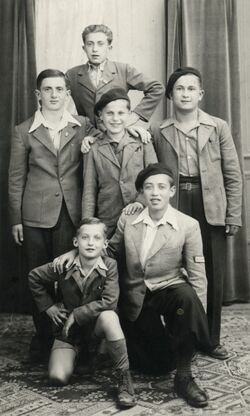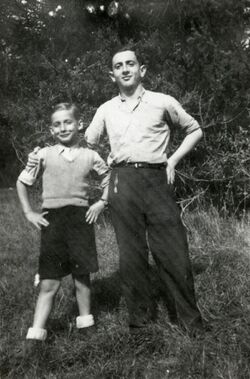Binem Wrzonski (M / Poland, 1928), Holocaust survivor


Binem Wrzonski (M / Poland, 1928), Holocaust survivor.
- KEWORDS : <Poland> <Lodz Ghetto> <Buchenwald> <Liberation of Buchenwald> -- <France> <OSE Orphanage>
Biography
Meir Binem (Benek, Beniek) Wrzonski was born in Lodz on March 10, 1928. He survived the Lodz Ghetto, until he was sent to Buchenwald. In March 1945 he suffered from typhus. He was at the hospital in critical conditions when the camp was liberated. Once recovered, he was among the 427 children sent to France with the OSE Train. He went to the Ambloy school for religious children, along with around 100 companions, including Elie Wiesel. As he was one of the oldest children he was assigned to work as a tutor for Izio Rosenman. He emigrated to Israel.
USHMM Profile
Meir Binem (Beniek) Wrzonski is the son of Noah Wrzonski (b. 1898 in Lodz) and was Rajzel Maroko (b. 1900 in Lodz). Both of his parents were Gerer Hassidim. Noah, who had attended yeshiva was a Talmud scholar, but supported himself as a textile merchant. Surprisingly though, all four of his sisters became communists and later fled to the Soviet Union. Noah and Rajzel married in 1920 and had five children. Meir Binem was born on March 10, 1928. He had three older siblings and one younger sister: Towa Tobcia (b. 1922), Kopel Yaakov (b. 1924), Moshe Yitzhak (b. 1926) and Golda (b. 1929). The family lived next to the Great Synagogue. All five children attended Jewish elementary schools. The two older boys later attended yeshiva and Towa went to a regular gymnasium. The family spoke Yiddish at home, though the children spoke Polish with each other.
On September 1, 1939 Germany invaded Poland. Towa fled Lodz after the Germans entered the city and crossed into the Soviet sector. She survived the war in Siberia and later in Tashkent in Uzbekistan where she worked as a nurse. Soon after the invasion, Moshe and Kopel were taken for forced labor. Moshe never returned. In 1940 the rest of the family was incarcerated in the Lodz ghetto. The head of the Jewish council, Chaim Rumkowski had obtained permission to establish an orphanage in the open area known as Marysin. Binem and Golda went to live there; the rest of the family moved to the main part of the ghetto. Noah became very ill from disease and malnutrition. On Rosh Hashanah 1941 Binem had a bad premonition about his father and asked for permission to visit him. He arrived in the ghetto only to discover he had died a few hours earlier on the second day of Rosh Hashanah, September 23, 1941. Noah was buried in the Jewish funeral. At the funeral, he was given the title Hamatmid - the persevering --a Hassidic honorific for someone who had studied Torah continuously. The following December, Rajzel sent Binem a note saying that she and Kopel were being held in a big hall in advance of a deportation and asking that he and Golda come visit. Binem visited them twice. When he arrived a third time, the hall was empty. Rajzel and Kopel were sent to Chelmno where they were gassed. In September 1942 Marysin was liquidated and the children were brought to the hospital. After a few days there was a selection. Binem and Golda went through immediately after a group of very young children which gave the illusion of their being much older. They were among the handful that were not deported and killed. Instead, they were brought to the main part of the ghetto and registered as workers. Golda stayed in the ghetto until its liquidation in 1944; she then was deported to Auschwitz where she perished.
With the help of the ghetto underground Binem received a work card which registered him as being four years older than he really was. In March 1944 he was taken to a labor camp in Czestochowa to work at the WARTA ammunition plant. The factory had both Polish and Jewish workers. Binem was put to work carrying heavy buckets of bullets. One day his Kapo asked if he knew a certain woman. When Binem said she used to be his neighbor, he responded that she was his fiancée. From that moment on, the Kapo gave Binem the extra task of peeling potatoes, which insured that he had enough to eat. Binem later was assigned to a commando building a casino for the Germans. The Polish masons there also took him under their wing, giving him extra food to eat. When the Germans planned to deport the Jewish prisoners, the Polish masons again protected Binem hiding him under the scaffolding. However after a few days, Binem decided to leave together with another prisoner from Lodz. They were boarded onto a freight train and brought to Buchenwald on January 18, 1945. Over the next few months Binem became ill with typhus and very emaciated; he could barely stand for roll-call unassisted. After the camp was liberated by American forces on April 11, 1945, Binem was hospitalized and gradually regained his health.
In June 5, 1945 Binem joined a group of boys and young teenagers, known as the "The Buchenwald Boys" who were brought to France in a special convey under the sponsorship of the O.S.E. They first were brought to Ecouis in Normandy. An aid worked helped Binem to make contact with his one surviving sibling, Towa who had spent the war in the Soviet Union. From Ecouis the children were taken to either secular or religious homes. Binem at first wanted to go to a secular home. but Leo Margolis, a German Jew who was in Buchenwald for approximately six years and helped care for the children, persuaded him to go to a religious home. Binem then went to Chateau d'Ambloy. From there he went to Taverny. Then together with two other teenagers, with Elie Wiesel and Kalman Kaliksztajn, he accompanied a group of younger boys to Chez Nous in Versailles where worked as a counselor. From this experience, Binem decided to become a teacher. After training in France, he immigrated to Israel and became the principal of a Youth Aliyah boarding school. In Israel he met and married Rahel Schlezinger and they went on to have five children and many grandchildren and great-grandchildren. In 1983 Binem returned to Lodz and erected a new marker at his father's graves including the names of all of his family members who died during the Holocaust.
Bibliography
- Judith Hemmendinger and Robert Krell, The Children of Buchenwald (Jerusalem: Gefen, 2000), p.186 (#409 Binem Wrzonski, b.1925?)
